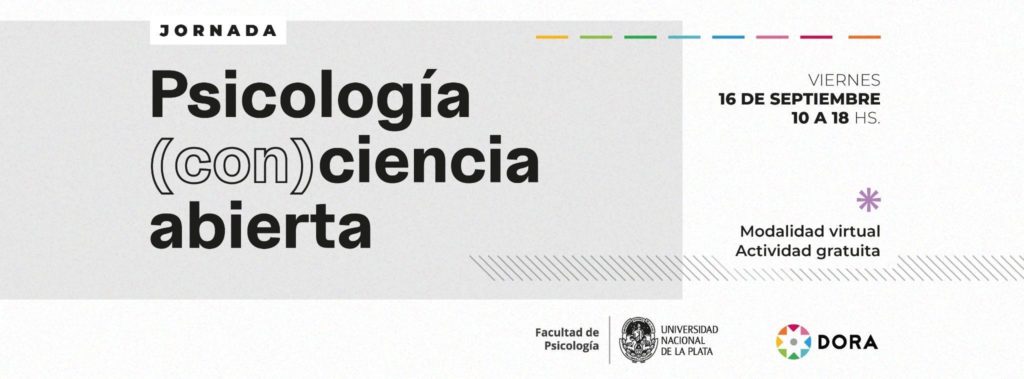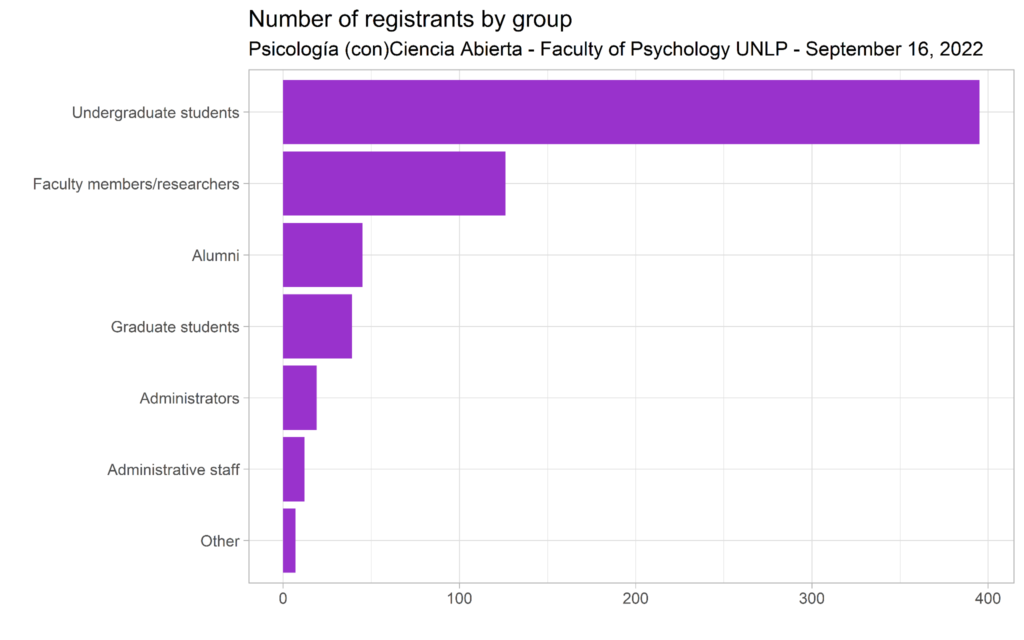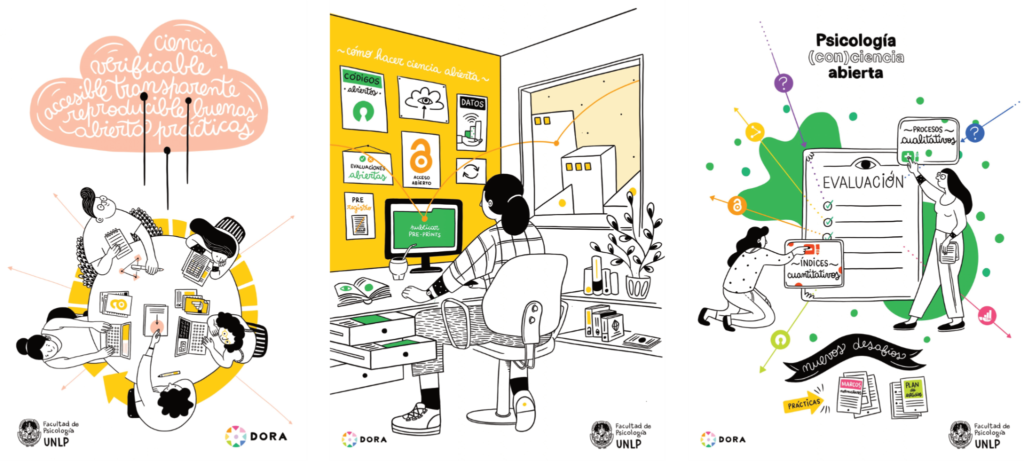A DORA Community Engagement Grants Report
In November 2021, DORA announced that we were piloting a new Community Engagement Grants: Supporting Academic Assessment Reform program with the goal to build on the momentum of the declaration and provide resources to advance fair and responsible academic assessment. In 2022, the DORA Community Engagement Grants supported 10 project proposals. The results of the “Psicología (con)Ciencia Abierta” Open Science Practices for Research and Research Assessment in Psychology and the Social Sciences project are outlined below.
By Nicolás Alessandroni, María Cristina Piro, Xavier Oñativia, Constanza Zelaschi, Maximiliano Vietri, Iván Suasnábar — Faculty of Psychology, Universidad Nacional de La Plata (Argentina)

Background
On September 16, 2022, the Faculty of Psychology of the Universidad Nacional de La Plata (UNLP, Argentina) held the virtual event “Psicología (con)Ciencia Abierta: Open Science Practices for Research and Research Assessment in Psychology and the Social Sciences”. The event, funded through a DORA Community Engagement Grant, was organized by a group of administrators and open science advocates coordinated by Dr. Nicolás Alessandroni. Over eight hours (10 AM–6 PM; GMT-3), attendees enjoyed one workshop and two panel discussions on open science and research assessment, with the presence of national and international Spanish-speaking experts. This was particularly relevant because, in Argentina, there are few spaces to discuss the implementation of open science and research assessment best practices in psychology and the social sciences.
Consistent with the spirit of the Declaration on Research Assessment (DORA), the event’s aim was twofold. On the one hand, to enable participants to identify and reflect on best practices for conducting and evaluating scientific research in psychology and the social sciences. On the other hand, to lay the foundations of an action plan for improving evaluation processes of academic production in the local context.
Although the event was open to all and had a virtual format to maximize the participation of all interested parties, it was designed with the academic community of the Faculty of Psychology UNLP—the host institution—in mind. Accordingly, three distinct groups of people were identified and targeted by the event: faculty members, researchers, and alumni, graduate and undergraduate students, and administrators of universities and research institutions. All the contents of the event were distributed through a website, an email account (ciencia.abierta@psico.unlp.edu.ar), and different social media accounts (i.e., Facebook and Instagram profiles for the event; Instagram profile and website of the Faculty of Psychology UNLP).
Project processes and outcomes
The outcomes of the event included a workshop and two panel discussions:
- The workshop “Una invitación a la ciencia abierta” [“An invitation to open science”] took place between 11 am and 1 pm, with presentations by Dr. Remedios Melero (Spain), Dr. Antonio Laguna-Camacho (Mexico), Dr. Gonzalo Villareal (Argentina), and Lic. Fernando Tonini (Argentina). This introductory session connected many students and researchers with open science for the first time. At the beginning of their presentations, the speakers provided a personal definition of “open science”. They also identified the practices it comprises and described the links between open science and research evaluation. In addition, they provided references to a variety of essential resources so that those unfamiliar with open science could learn more after the event. The attendees actively participated by posting their comments and questions on a virtual wall created online, allowing a fluid exchange at the end of the speakers’ presentations.
- The first panel discussion took place between 2 and 4 pm and was entitled “Desafíos para la investigación en psicología y ciencias sociales desde el paradigma de la ciencia abierta” [“Challenges for researching in psychology and the social sciences from the open science paradigm”]. It was led by Dr. Nicolás Alessandroni (Canada/Argentina). Dr. Alessandroni focused his presentation on five open science practices: (a) publishing pre-prints, (b) doing open peer review, (c) engaging in open access publishing, (d) depositing open data in open repositories, and (e) pre-registering studies. He described the specifics of each practice and presented the challenges faced by researchers in incorporating them into their daily workflows. He also discussed the interactions between increasingly widespread forms of conducting research nowadays (e.g., Big Team Science) and the growing number of open science mandates developed by governments and research institutions worldwide. Finally, considering the global progress in the implementation of open science practices and the evolving landscape of research assessment, he reflected on the importance of generating institutional criteria to assess the broad spectrum of outputs of scientific practice during academic evaluation processes.
- “La ciencia abierta y la evaluación de la producción científica” [“Open science and research assessment”] was the title of the second panel discussion that brought together, from 4 to 6 p.m., Lic. Esp. María Cristina Piro (Argentina), Dr. Marisa de Giusti (Argentina) and Lic. Soledad Cottone (Argentina). The three panel members hold management positions in educational institutions in Argentina. This fostered a rich discussion that revolved around the reforms that management teams can encourage to promote the implementation of open science practices and more transparent and democratic methods for academic evaluation. Discussed issues included the limitations of current incentive structures, the disconnection that often exists between research activity and the needs of local communities, the lack of consideration of the social impact of research, the difficulties in making changes in the curriculum to integrate open science practices, and the applicability of the laws that regulate research practices and their evaluation in Argentina. Most notably, all these items connect well with the five dimensions considered in the SPACE Rubric to evolve academic assessment.
A total of 643 people from 94 institutions registered for the event. As for the countries represented, there were people from Argentina (538), Paraguay (54), Bolivia (14), Colombia (9), Peru (7), Uruguay (6), Ecuador (4), Spain (4), Chile (2), Costa Rica (2), México (2), and Guatemala (1). A highlight is that 61% of the registrants (395) were undergraduate students, demonstrating the interest of young people—who will be the next generation of researchers—in more open, responsible, and inclusive ways of investigating and evaluating academic production. Among registrants, 126 were faculty/researchers, 45 were alumni, 39 were graduate students, 19 were administrators, 7 were administrative staff, and 12 belonged to other groups (see Figure 1).

In terms of fields, 596 registrants belonged to psychology, 7 to sociology, 6 to anthropology, 3 to psychopedagogy, 3 to social communication, and 28 to other areas. Overall, these data show that the event reached a varied audience, representing individuals from the local community at different stages of career development in various disciplinary fields.
Future prospects
The Faculty of Psychology UNLP has included open science and academic assessment reform as an institutional priority within its management plan 2022-2026. The event’s conclusions will inform future endeavors, including more training and discussion events and the design of institutional policies. The organizing team is currently working on transcribing the presentations that took place during the day. This material, together with illustrations specially generated by Julieta Longo after each session—openly available through a CC-BY license—, will serve as the basis for a book aimed at contributing to the promotion of open science and the reform of academic evaluation in the Spanish-speaking context (see Figure 2).

Those interested in contacting the organizing team can do so via email at ciencia.abierta@psico.unlp.edu.ar.

